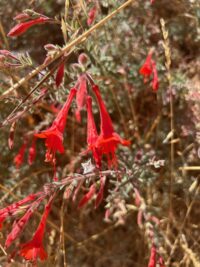
On the evening of the Summer Solstice, after walking my dog and watching the sunset, I spotted a coyote trotting along the fence line between the Montini property and open space. To watch, I pulled over next to the pasture where cows were settling down for the evening.
The coyote trotted one way, then suddenly reversed course, ignoring the cows and the jogger coming down the trail from the open space. In the twilight, the wild canine appeared cool gray and white, moving with energy and focus. Then it disappeared into the high grass.
I’ve seen many coyotes around Sonoma Valley. Most seemed healthy and well-fed, with a thick coat tinged with rust and gold. Over the winter, I spooked a pair of coyotes who were bedded down between the creek and vineyards at Bartholomew Park. We watched each other closely as I walked on. I was impressed by their beauty, with intent eyes and gorgeous ears.
Coyotes seem to be just about everywhere nowadays. Urban coyotes make news living in the heart of cities like San Francisco, where they become bold enough to prey on dogs and scare people.
In Sonoma Valley, our rural coyotes tend to keep their distance, roaming across ranches and open space, making regular cameos on wildlife cameras. Chances are you’ve heard coyotes yip and yowl at night.
Coyotes have been part of human life and lore for a very long time. They appear in many Native American stories. In one, Coyote created the world from the top of Sonoma Mountain long before humans were here. He was married to Frog Woman, and after trials and tribulations, their sons became the sun and moon; her tears the creeks and streams pouring down the mountain. Frog woman would forever look up at her sons.
Some of us first encountered the coyote on TV cartoons with the Road Runner and Wile E. Coyote, who was always falling off a cliff or getting blown up, only to return unscathed. As a dog person, I’ve always loved all canines. So much so that I own a pair of fake furry “coyote ears” that everyone says look almost too natural when I clip them on.
The actual coyote is about the size of a medium dog, about 20 to 40 pounds. Its narrow face and snout with big ears and slender body makes it distinct from the typical domestic dog. Every coyote has a black tip on its tail. Moving quickly and quietly through the landscape, usually at a trot, the tracks left behind are tight and linear. A dog’s are splayed and erratic.
As medium-sized predators or mesopredators, coyotes help keep rodent populations in check by consuming mice, voles, and gophers along with rabbits. Fruit and berries are also on the menu. I’ve seen evidence in coyote scat full of grape seeds and skins.
Because they sometimes munch on grapes, livestock and even pets, not everyone likes coyotes. For decades, coyotes were considered varmints. Ranchers, hunters and government wildlife officials have killed hundreds of thousands of coyotes across the country in an attempt to prevent preying on livestock and crops.
It continues, as in 2022 when about 53,000 coyotes were shot, poisoned or trapped by the US Wildlife Services, of which more than 3,000 were killed in California.
Sonoma County cut ties with the wildlife services in response to public pressure. Instead non-lethal measures to dissuade coyotes from venturing into sheep pastures and chicken coops are standard here. Guard dogs, fencing and keeping trash contained are a few of the best practices.
I never realized until now that anyone with a hunting license can legally shoot as many coyotes as they want in California. There are no limits and no reporting. However, I haven’t seen any signs of coyote hunting around here.
In the face of all this, the coyote has managed to expand its range across the U.S. Studies have found that when you try to get rid of coyotes, they will rebound even stronger. Perhaps that is why they call them the wily coyote, or sometimes the trickster or joker.
While it appears that coyote populations are healthy in Sonoma Valley and beyond, no one really knows how many are out there.
I’ll always feel joy when I see a coyote.
What a wild Valley!




Be First to Comment